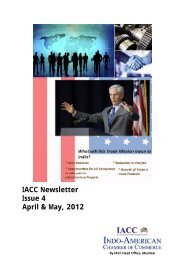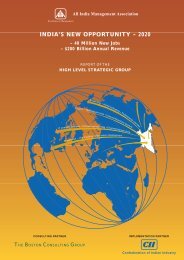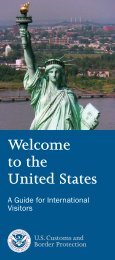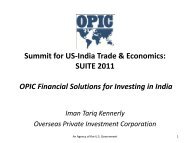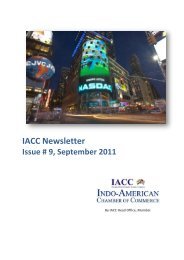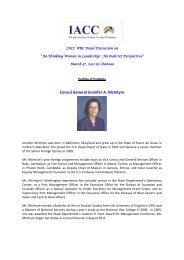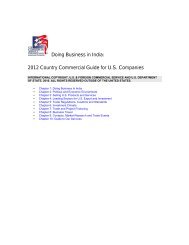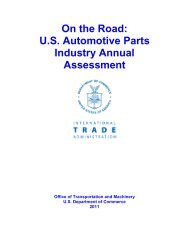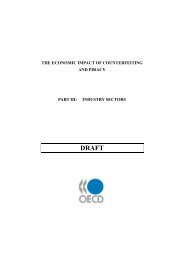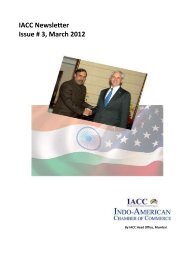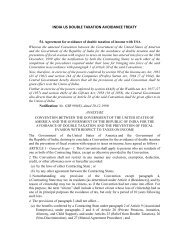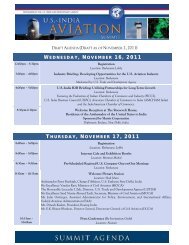Importing into the United States - Indo-American Chamber Of ...
Importing into the United States - Indo-American Chamber Of ...
Importing into the United States - Indo-American Chamber Of ...
Create successful ePaper yourself
Turn your PDF publications into a flip-book with our unique Google optimized e-Paper software.
40. IMPORT QUOTAS<br />
An import quota is a quantity control on<br />
imported merchandise for a certain period of<br />
time. Quotas are established by legislation, by<br />
directives, and by proclamations issued under<br />
<strong>the</strong> authority contained in specific legislation.<br />
The majority of import quotas are administered<br />
by <strong>the</strong> U.S. Customs Service. The Commissioner<br />
of Customs controls <strong>the</strong> importation of<br />
quota merchandise but has no authority to<br />
change or modify any quota.<br />
<strong>United</strong> <strong>States</strong> import quotas may be<br />
divided <strong>into</strong> two types: absolute and tariff-rate.<br />
Under <strong>the</strong> North <strong>American</strong> Free Trade Agreement<br />
(NAFTA), <strong>the</strong>re are tariff-preference<br />
levels, which are administered like tariff-rate<br />
quotas.<br />
Tariff-rate quotas provide for <strong>the</strong> entry of<br />
a specified quantity of <strong>the</strong> quota product at a<br />
reduced rate of duty during a given period.<br />
There is no limitation on <strong>the</strong> amount of <strong>the</strong><br />
product that may be entered during <strong>the</strong> quota<br />
period, but quantities entered in excess of <strong>the</strong><br />
quota for <strong>the</strong> period are subject to higher duty<br />
rates. In most cases, products of Communistcontrolled<br />
areas are not entitled to <strong>the</strong> benefits<br />
of tariff-rate quotas.<br />
Absolute quotas are quantitative, that is,<br />
no more than <strong>the</strong> amount specified may be permitted<br />
entry during a quota period. Some<br />
absolute quotas are global, while o<strong>the</strong>rs are<br />
allocated to specified foreign countries. Imports<br />
in excess of a specified quota may be held for<br />
<strong>the</strong> opening of <strong>the</strong> next quota period by placing<br />
it in a foreign trade zone or by entering it for<br />
warehouse, or it may be exported or destroyed<br />
under Customs supervision.<br />
The usual Customs procedures generally<br />
applicable to o<strong>the</strong>r imports apply with respect<br />
to commodities subject to quota limitations.<br />
The quota status of a commodity subject<br />
to a tariff-rate quota cannot be determined in<br />
advance of its entry. The quota rates of duty are<br />
ordinarily assessed on such commodities<br />
entered from <strong>the</strong> beginning of <strong>the</strong> quota period<br />
until such time in <strong>the</strong> period as it is determined<br />
that imports are nearing <strong>the</strong> quota level. Port<br />
directors of Customs are <strong>the</strong>n instructed to<br />
require <strong>the</strong> deposit of estimated duties at <strong>the</strong><br />
over-quota duty rate and to report <strong>the</strong> time of<br />
official presentation of each entry. A final determination<br />
is <strong>the</strong>n made of <strong>the</strong> date and time<br />
when a quota is filled, and all port directors are<br />
advised accordingly.<br />
Some of <strong>the</strong> absolute quotas are invariably<br />
filled at or shortly after <strong>the</strong> opening of <strong>the</strong><br />
quota period. Each of <strong>the</strong>se quotas is <strong>the</strong>refore<br />
officially opened at noon Eastern Standard<br />
Time, or <strong>the</strong> equivalent in o<strong>the</strong>r time zones, on<br />
<strong>the</strong> designated effective date. When <strong>the</strong> total<br />
quantity for <strong>the</strong>se entries filed at <strong>the</strong> opening of<br />
<strong>the</strong> quota period exceeds <strong>the</strong> quota, <strong>the</strong> merchandise<br />
is released on a pro rata basis, <strong>the</strong> pro<br />
rata being <strong>the</strong> ratio between <strong>the</strong> quota quantity<br />
and <strong>the</strong> total quantity offered for entry. This<br />
assures an equitable distribution of <strong>the</strong> quota.<br />
Merchandise is not regarded as presented<br />
for purposes of determining quota priority<br />
until an entry summary or withdrawal from<br />
warehouse for consumption has been submitted<br />
in proper form and <strong>the</strong> merchandise is<br />
located within <strong>the</strong> port limits.<br />
COMMODITIES SUBJECT TO<br />
QUOTAS ADMINISTERED BY<br />
CUSTOMS<br />
As provided in <strong>the</strong> Harmonized Tariff<br />
Schedule of <strong>the</strong> <strong>United</strong> <strong>States</strong>, <strong>the</strong> commodities<br />
listed below are subject to quota limitations in<br />
effect as of <strong>the</strong> date of publication of this book.<br />
Local Customs officers can be consulted about<br />
any changes.<br />
Information may also be obtained by contacting<br />
<strong>the</strong> Quota Staff, U.S. Customs Service,<br />
1300 Pennsylvania Avenue NW, Washington,<br />
DC 20229, Tel. 202.927.5850.<br />
Tariff-Rate Quotas<br />
■<br />
■<br />
■<br />
■<br />
■<br />
Anchovies<br />
Brooms<br />
Broom corn brooms<br />
Ethyl alcohol<br />
Lamb<br />
IMPORTING INTO THE UNITED STATES<br />
89



